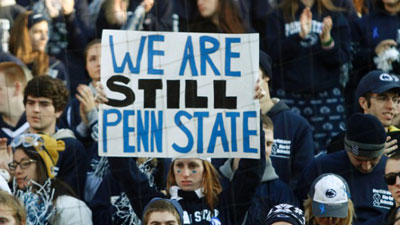Page 1 Page 2 Page 3 Page 4 Page 5

Though the Freeh report made it plain that only five men were involved (including the perpetrator himself), and although all five men were gone from the university, the mob insisted that the fault lay with “the institution.” In the water-cooler conversations, in discussions in the pubs and sports bars, on talk radio programs and on Internet chat boards, people associated with Penn State were no longer individuals. We were nameless and faceless. Regarded collectively, we were members of a single guilty body. It was what I had feared during the jury deliberations of the trial had a “not guilty” verdict been rendered. Hell, to some degree I’d done it myself back then. I had regarded the university and town as a collective whole, rather than as a collection of individuals, and I had wondered if I could continue to live there. But now I began to understand the real ramifications. We were – each of us here – now one of them. And those on the other side, those identifying themselves as us, were legion. My summer home, innocent and beautiful in my eyes, had come under siege, seemingly from the whole of the rest of America.
And though I hadn’t consciously asked for it, I had never felt more a part of anything in my life.
The mob mentality took me by surprise, though history shows it should not have. The critical thing in this case, I suppose, is that I had never before been a part of the targeted group. The torches had never before lit up my front gate. It was disconcerting. It was disheartening.
Even more disheartening was that it would be the mob itself that would eventually dictate the terms of our surrender. The NCAA would buckle to the political pressure just eleven days later, crippling the Penn State football program with unprecedented sanctions from which it may never recover, with the head of the NCAA – whose job in part is to encourage a reverence for football – theatrically lamenting Penn State’s reverence for football. The news was received very well by the mob (though some screamed for more, including a permanent end to the football program) with precious few nationally recognized media pundits attempting to point out the NCAA hypocrisy or the overreach into a criminal matter well beyond the field of play, the NCAA’s purported purview.
Such a position, if not handled delicately, would have been worse than unpopular; it would have turned the person taking it into one of them. It’s a side nobody wanted to be on. The stakes were high. The issue was simple: child rape. If you were perceived to be some kind of apologist for the institution, you were also perceived as condoning the concealment of pedophilia. Black or white. Penn State or the children. Which side were you on? As an alum, you had to be careful. If you argued against the NCAA sanctions (even the exceedingly bizarre one that “vacated” the 112 Penn State football victories since 1998, making believe that those games had never been played), it was clear that you “just didn’t get it.” This became the mantra. Penn State people who chafed against the unprecedented draconian punishment, just didn’t get it. It’s not about football, we were told again and again and again. It’s about kids. Couldn’t we see that?
Well, let me start out by saying how much we all grieve for the real victims in this tragedy,” was the talking point that anyone arguing against the sanctions simply had to make. It bordered on parody, but time and again the stipulation had to be offered before anything else could be said. You had to show your “I get it” card. And although the people still associated with the university (the hundreds of thousands minus the five individuals mentioned in the Freeh Report who were gone) were guilty of nothing more than those in Ann Arbor or Columbus or South Bend or Norman or Lincoln or Austin or Athens – a love of football – they all had to accept the sanctions. Failing to do so would call into question their sense of fairness and justice for the children, even their desire for a world where children would be safe from pedophiles. College football at Penn State and the safety of children were now, somehow, mutually exclusive. And we needed to get that. We needed to get the message that we were being used to send. At our most innocent, we were, as it was put time and again, “collateral damage.” And collateral damage is acceptable. This is just how it works with institutions that get punished, no less than a Yale professor asserted in a national column, an argument that was essentially more shrug than explication.

